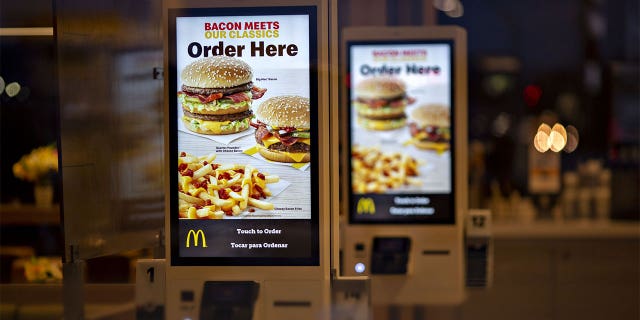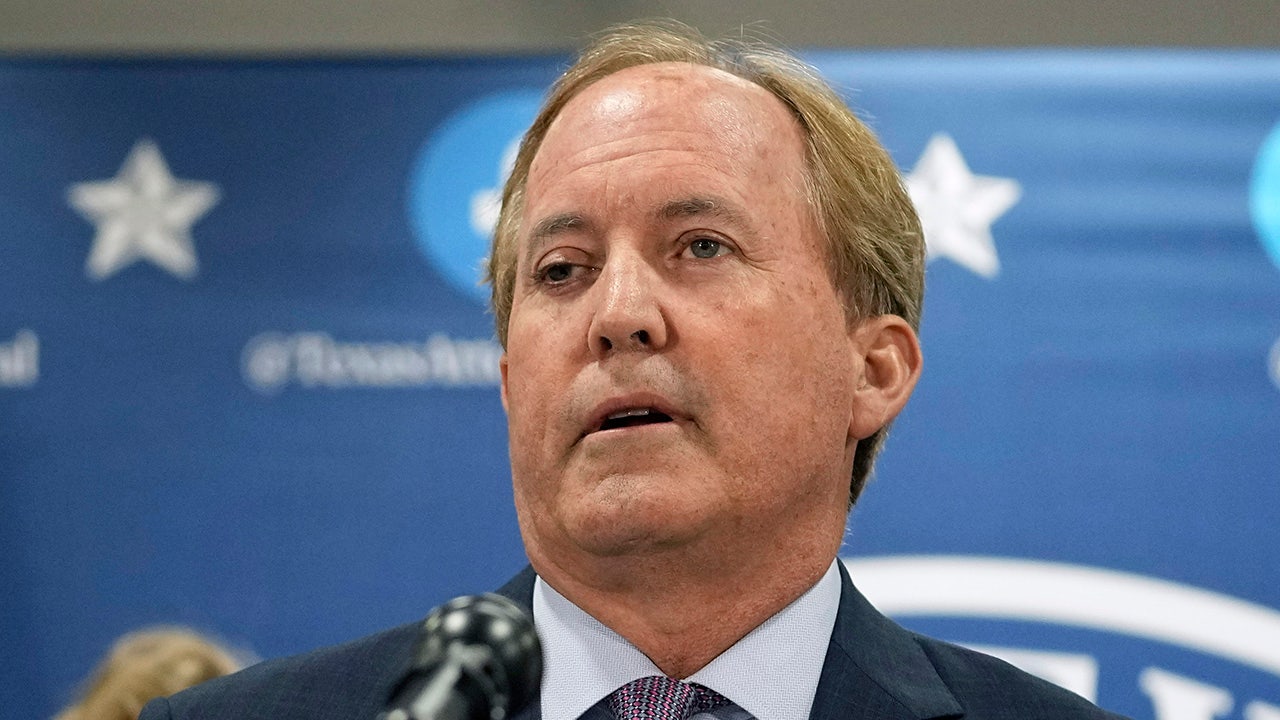Politics
‘Should be concerned’: Congress opens up on new threats posed to US labor market

WASHINGTON, D.C. – Congressional lawmakers told Fox News they’re concerned about how artificial Intelligence will impact the job market, but were unsure how to approach the issue.
“I don’t have answers,” Rep. Adam Smith, a Democrat, said. “There’s no question AI is an incredibly disruptive technology, and we should be closely looking at the implications of it and how best to handle those implications.”
An AI-powered robot waiter makes a drink at a robotics show. (Photo by Leon Neal/Getty Images)
Republican Rep. Ben Cline said he was less concerned.
“New technologies have come and gone, and with them you have displacement, not necessarily jobs lost, but jobs added and jobs shifting,” he said. “For AI, my concern is less with job displacement and more with national security dangers and protecting that national security infrastructure from AI.”
WATCH CONGRESSIONAL LAWMAKERS SOUND OFF ON HOW AI COULD THREATEN AMERICAN JOBS:
WATCH MORE FOX NEWS DIGITAL ORIGINALS HERE
AI advancements could reduce or eliminate 300 million jobs globally, and could cause a “significant disruption” across labor markets, according to a Goldman Sachs analysis published in March.
Most restaurant jobs could be automated in the next five to 10 years, a tech CEO whose AI has placed over a million drive-through orders, told Fox News this week. Lawmakers have repeatedly voiced concern over AI.

McDonald’s employed more than 150,000 people globally in its company-owned restaurants and corporate roles prior to recent layoffs in April. (Daniel Acker/Bloomberg via Getty Images, File)
“I think AI is a danger. It does replace Americans’ jobs,” Rep. Marjorie Taylor Greene said. “This is where Congress—we have to work harder to figure out how to control this.”
“There’s many dangers to American jobs, not just AI. It’s people coming across the border, competition from other foreign countries,” the Georgia Republican continued. “We have to do everything we can to protect American jobs, including against AI.”
DID JOE BIDEN OR KEVIN MCCARTHY CAVE IN DEBT CEILING NEGOTIATIONS? CONGRESS SOUNDS OFF
Rep. Byron Donalds of Florida also said AI is a concern for workers.
“When you’re trying to replace jobs, the American people should be concerned about that,” the Republican said. “With AI, I think there’s a lot of stuff that we need to study up on and get to know it very, very fast.”
House members from both parties told Fox News the country needs better education on AI to ensure the labor market is ready for next-generation jobs.

Rep. Debbie Wasserman Schultz told Fox News that Congress needs to listen to AI experts. (Fox News Digital/Jon Michael Raasch)
“Experts that were part of creating this technology say that it’s an existential threat to humanity,” Rep. Debbie Wasserman Schultz, a Democrat, told Fox News. “We might want to listen.”
Republican Rep. Mike Flood said the U.S. must prepare students for the skills needed in the digital generation, including AI coding.
“We’re going to need a lot higher-skilled workers in the workforce, and that requires our educational system to step up,” Flood told Fox News.
“Let’s work hard like we did when we decided we wanted to go to the moon and our entire nation put our strength behind it,” he said. “We need to do that now with our kids, get them the skills they need and, you know, be ready for 2030.”
To watch lawmakers’ full interviews, click here.

Politics
Trump Has Raised Questions About Fort Knox. His Allies Are Trying to Cash In.

It is one of the more baffling story lines of Donald J. Trump’s second term. The president has said he wants to personally visit Fort Knox to ensure that no one has stolen the government-owned gold bars that are stored there.
Mr. Trump has not explained why any gold might be missing from the nation’s heavily guarded reserves. His own Treasury secretary, Scott Bessent, has insisted that there is no reason to worry. “All the gold is there,” Mr. Bessent emphatically told Bloomberg in February, at one point looking directly into a camera and addressing the American people.
Mr. Trump’s interest in the gold reserves has been largely overshadowed by his family’s involvement in various cryptocurrency ventures, which has raised ethical concerns about potential conflicts of interest.
The president has a long history of embracing conspiracy theories, and is known to be a fan of golden and gilded things. It is difficult to say what exactly is behind his recent fanning of unfounded fears about Fort Knox, which have been floating around since at least the 1970s.
A White House spokesperson did not respond when asked to comment for this story.
What is certain is that gold is on many investors’ minds these days. Generally seen as a safe place to park wealth during tumultuous periods, the precious metal has risen to record prices recently, in part because of the global economic uncertainty that the president’s shifting tariff policies caused.
Some of Mr. Trump’s allies, including his eldest son, serve as pitchmen for gold investment companies that advertise heavily on their podcasts or radio shows.
And some of them have been using fresh concerns about Fort Knox to make a profit.
The Gold Conspiracy That Wouldn’t Go Away
If nothing else, Mr. Trump’s Fort Knox obsession has resurfaced one of the deeper cuts in the American conspiracy theory catalog.
One reason the government holds onto such large stores of gold is to confer a sense of financial stability, even though the country moved off the gold standard in the 20th century. According to the United States Mint, 147.3 million ounces of gold, about half of the government’s stash, is held at Fort Knox.
The Kentucky facility, known formally as the United States Bullion Depository at Fort Knox, almost never allows visitors and is kept under famously heavy lock and key — an inaccessibility that may explain much of the intrigue around it.
One of the main early proponents of the idea that gold was missing from Fort Knox was a lawyer named Peter Beter, who earned a modicum of notoriety in the 1970s by spreading dark theories in a mail-order audio cassette series. Among other things, Mr. Beter believed that “organic robotoids,” controlled by Bolsheviks, had infiltrated the federal government.

By 1974, concerns about the gold reserves grew so intense that a congressional delegation and a few news outlets, including The New York Times, were invited to Fort Knox for a rare inspection. A reporter for The Times described the effect of seeing a vault 6 feet wide and 12 feet deep, stacked with 36,236 glistening gold bars, as “awesome.”
Another wave of concern crested in 2011, when then-Representative Ron Paul, the Texas Republican, introduced a bill calling for an inventory of the reserves. At a subcommittee hearing, Mr. Paul said people had become worried that “the gold had been secretly shipped out of Fort Knox and sold.” He added, “And, still others believe that the bars at Fort Knox are actually gold-plated tungsten.”
U.S. House of Representatives
The inspector general of the Treasury Department at the time, Eric Thorson, told Mr. Paul that audits were performed yearly, with “no exceptions of any consequence.”
U.S. House of Representatives
More recently, Mr. Trump’s first-term Treasury secretary, Steve Mnuchin, had a chance to check on the gold in August 2017, with Mitch McConnell, then the Senate majority leader, in tow. Photos were taken of the men among the gold bars.
“Glad gold is safe!” Mr. Mnuchin wrote on Twitter, now known as X.
Questions About Ft. Knox Bubble Up Again
The latest concerns appear to have taken off on Feb. 14, when the website ZeroHedge, which occasionally promotes conspiracy theories, tagged Elon Musk in a post on X. The post asked him to make sure the gold at Fort Knox is there.
“Surely it’s reviewed at least every year?” Mr. Musk replied.
“It should be. It isn’t,” ZeroHedge responded. (Mr. Bessent, the Treasury secretary, would later say that the gold is still audited annually.)
Senator Rand Paul of Kentucky, a Republican and the son of Ron Paul, chimed in, calling for an audit. “Let’s do it.”
The next day, Alex Jones, the “InfoWars” conspiracy theorist, said on his talk show that when he was a child, his great-uncle told him some of the gold was missing, and that the “deep state” was involved in the “crime of the century.”
Mr. Musk responded to this post as well. “It would be cool to do a live video walkthrough of Fort Knox!” he wrote.
Then came Glenn Beck, the conservative radio and TV host, who posted an open letter to Mr. Trump the next day, asking if he could take a camera crew to Fort Knox to “restore faith in our financial system.”
The chatter about the gold reserves was growing louder.
By Feb. 20, Mr. Trump was telling a press gaggle on Air Force One that he planned to go to Fort Knox to “make sure the gold is there.”
How the Conspiracy Theory Has Been Integrated Into Sales Pitches for… Gold
Since then, the idea that the government’s gold reserves may have gone missing has been integrated into the sales pitches of companies that trade in gold coins and gold investment accounts. The companies advertise heavily on Trump-friendly TV and internet shows.
InfoWars, The Dan Bongino Show, The Ben Shapiro Show, Triggered with Don Jr.
A number of “gold I.R.A.” companies have suggested that a future audit of Fort Knox could determine that gold is missing, setting off a crisis among Americans about the stability of the economy. Amid such chaos, the companies argue, privately held gold would be a lucrative safe haven for investors.
One of the companies, Birch Gold Group, is endorsed by the president’s eldest son and bills itself as “Donald Trump Jr’s gold company.” A recent article on Birch Gold’s website stated that the idea of an “empty Fort Knox” had gone “from conspiracy theory to mainstream concern.” A discovery that gold was missing from Fort Knox, the article stated, would be the “quickest way down for the U.S. dollar.”
“It is only those without physical gold exposure that feel the need to panic, perhaps with good reason, about the greenback’s admittedly dismal prospects,” states the article, which is accompanied by an offer for a “FREE gold IRA info kit.”
The younger Mr. Trump lauded his father’s plans to visit Fort Knox in a Feb. 24 episode of his online talk show, on which he regularly makes pitches for Birch Gold. “If it’s empty,” he said, “I would imagine there’s hell to pay.”
On Feb. 27, Lear Capital, a gold company that Mr. Beck promotes, posted, “As calls for a Fort Knox audit grow louder, investors should stay informed and consider their exposure to gold as part of a diversified portfolio.”
On Instagram, Rogan O’Handley, a conservative influencer who goes by the handle DC Draino, posted a plug for Donald Trump Jr.’s preferred gold company.
“If Fort Knox is empty, do you know what Gold prices will do?,” Mr. O’Handley wrote. “Get a **Free** info packet from Birch Gold – LINK IN MY BIO – to learn more about @birchgold’s tax-advantaged precious metals retirement plans.”
On another section of Birch Gold’s website, a “Message from Donald Trump Jr.” raised the possibility that his father’s administration could “revalue America’s gold reserves on the national balance sheet from their outdated book value of $42” — the price per ounce the government assigns for bookkeeping purposes — “to current market prices.”
This, he wrote, “could cause a surge in gold prices.” He added, “The potential upside for gold investors is substantial.” A gold I.R.A., he added, would be a great way to benefit. He did not mention that Mr. Bessent had publicly stated that he had no plans to revalue the gold reserves.
Above the message was a digitally altered photo of the president at a desk, showing off an important-looking signed document, a wall of gold bricks behind him.
Mr. Trump has still not visited Fort Knox.
Politics
Trump admin asking federal agencies to cancel remaining Harvard contracts

The Trump administration is asking all federal agencies to find ways to terminate all federal contracts with Havard University amid an ongoing standoff over foreign students’ records at the Ivy League school.
The General Services Administration is planning to send a letter Tuesday instructing all federal agencies to review the estimated $100 million remaining in federal contracts with Harvard and potentially “find alternative vendors,” according to a copy of the letter obtained by Fox News.
The remaining federal contracts include a $527,000 agreement for Harvard ManageMentor Licenses, which was awarded in September 2021, a $523,000 contract for Harvard to conduct research on energy drinks and the health outcomes of other dietary intakes overtime, which was awarded in August 2023, and a $39,000 contract for gradate student research services, which was award in April 2025, a source familiar with the matter told Fox News.
TRUMP ACCUSES HARVARD OF BEING ‘VERY SLOW’ TO TURN OVER FOREIGN STUDENT INFO
Protesters outside Harvard University in Cambridge, Mass., April 25, 2025. (JOSEPH PREZIOSO/AFP via Getty Images)
The New York Times first reported about a draft of the letter.
In the letter, GSA’s Federal Acquisition Service Commissioner Josh Gruenbaum said Harvard “continues to engage in race discrimination, including in its admissions process and in other areas of student life.”
He said Harvard has shown “no indication” of reforming its admissions process, despite the Supreme Court ruling that university’s long-standing policy discriminates on the basis of race.
For applicants in the top academic decile, admissions rates were 56% for African-Americans, 31% for Hispanics, 15% for Whites and 13% for Asians, according to the lawsuit. Gruenbaum said Harvard “now has to offer a remedial math course, which has been described as ‘middle school math’ for incoming freshmen.” He said that was a direct result “of employing discriminatory factors, instead of merit, in admission decisions.”
Gruenbaum also cited possible violations of Title VII of the Civil Rights Act of 1964 regarding Harvard’s hiring, promotion, compensation, and other personnel-related actions. He said discriminatory practices “have been exposed at the Harvard Law Review, where internal documents that have been made public detail the pervasive and explicit racial discrimination in the publication’s article selection and editor appointment process.”
“GSA is also aware of recent events at Harvard University involving anti-Semitic action that suggest the institution has a disturbing lack of concern for the safety and wellbeing of Jewish students,” Gruenbaum wrote. “Harvard’s ongoing inaction in the face of repeated and severe harassment and targeting of its students has at times grounded day-to-day campus operations to a halt, deprived Jewish students of learning and research opportunities to which they are entitled, and profoundly alarmed the general public.”
Fox News Digital reached out to Harvard University for comment Tuesday.

President Donald Trump speaks during the Memorial Day wreath-laying in Arlington National Cemetery on May 26, 2025. (Kayla Bartkowski/Getty Images)
Harvard has already sued in federal court seeking the restoration of about $3.2 billion in federal grant funding already frozen by the administration since last month.
In a separate suit, the university was granted a temporary restraining order on Friday that temporarily blocks the government from canceling the school’s certification in the Student and Exchange Visitor Program. The program permits the university to host international students with F-1 or J-1 visas to study in the U.S. Harvard said the revocation would impact more than 7,000 visa holders – more than a quarter of its student body.
A brief federal court hearing was held Tuesday morning in federal court in Boston on the matter. A judge scheduled another hearing for Thursday to allow both parties more time to present their case.
President Donald Trump said in a TRUTH Social post on Monday that he is “considering taking Three Billion Dollars of Grant Money away from a very antisemitic Harvard, and giving it to TRADE SCHOOLS all across our land.”
“What a great investment that would be for the USA, and so badly needed!!!” he wrote.
JUDGE TEMPORARILY PAUSES TRUMP MOVE TO CANCEL HARVARD STUDENT VISA POLICY AFTER LAWSUIT
The president also accused Harvard of being “very slow” in handing over documents about foreign students and of having “shopped around and found the absolute best judge (for them).”
Department of Homeland Security (DHS) Secretary Kristi Noem said last week that she revoked Harvard’s certification after the university refused to comply with multiple requests for information on foreign students while “perpetuating an unsafe campus environment that is hostile to Jewish students, promotes pro-Hamas sympathies, and employs racist ‘diversity, equity and inclusion’ policies.”

A pedestrian with an umbrella walks by Harvard Yard as a Nor’easter hits the New England area in Cambridge, MA on May 22, 2025. (Danielle Parhizkaran/The Boston Globe via Getty Images)
The requested records include any and all audio or video footage in Harvard’s possession regarding threats to other students or university personnel, “deprivation of rights” of other classmates or university personnel, and “dangerous or violent activity, whether on or off campus” by a nonimmigrant student enrolled at Harvard in the last five years.
Noem is also asking for any and all disciplinary records and audio or video footage of any protest activity involving nonimmigrant students. DHS said that Harvard’s responses so far have been insufficient.
Fox News’ Sarah Tobianski contributed to this report.
Politics
Commentary: A celebration — and wake — for a political time gone by

PALM DESERT — They came to the baking desert to honor one of their own, a political professional, a legend and a throwback to a time when gatherings like this one — a companionable assembly of Republicans, Democrats and the odd newspaper columnist — weren’t such a rare and noteworthy thing.
They came to bid a last farewell to Stuart Spencer, who died in January at age 97.
They came to Palm Desert on a 98-degree spring day to do the things that political pros do when they gather: drink and laugh and swap stories of campaigns and elections past.
And they showed, with their affection and goodwill and mutual regard, how much the world, and the world of politics, have changed.
“This is how politics used to be,” Democrat Harvey Englander said after sidling up to Republican Joel Fox. The two met through their work with the Howard Jarvis Taxpayers Assn., a spawn of the Proposition 13 taxpayer revolt, circa 1978.
“We had different views of how government should work,” Englander said as Fox nodded his assent. “But we agreed government should work.”
Spencer was a campaign strategist and master tactician who helped usher into office generations of GOP leaders, foremost among them Ronald Reagan. The former president and California governor was a Hollywood has-been until Spencer came along and turned him into something compelling and new, something they called a “citizen-politician.”
Hanging, inevitably, over the weekend’s celebration was the current occupant of the Oval Office, a boiling black cloud compared to the radiant and sunshiny Reagan. Spencer was no fan of Donald Trump, and he let it be known.
“A demagogue and opportunist,” he called him, chafing, in particular, at Trump’s comparisons of himself to Reagan.
“He would be sick,” Spencer said, guessing the recoil the nation’s 40th president would have had if he’d witnessed the crass and corrupt behavior of the 45th and 47th one.
Many of those at the weekend event are similarly out of step with today’s Republican Party and, especially, Trump’s bomb-the-opposition-to-rubble approach to politics. But most preferred not to express those sentiments for the record.
George Steffes, who served as Reagan’s legislative director in Sacramento, allowed as how the loudly and proudly uncouth Trump was “180 degrees” from the politely mannered Reagan. In five years, Steffes said, he never once heard the governor raise his voice, belittle a person or “treat a human being with anything but respect.”
Fox, with a seeming touch of wounded pride, suggested Trump could use “some pushback from some of the ‘old thinking’ of the Stu Spencer/Ronald Reagan era.”
A flag flown over the U.S. Capitol in Spencer’s honor was displayed at his memorial celebration, along with White House schedules from the 1984 campaign.
(H.D. Palmer)
Behind them, playing on a big-screen TV, were images from Spencer’s filled-to-the-bursting life.
Old black-and-white snapshots — an apple-cheeked Navy sailor, a little boy — alternated with photographs of Spencer smiling alongside Reagan and President Ford, standing with Dick Cheney and George H.W. Bush, appearing next to Pete Wilson and Arnold Schwarzenegger. (Wilson, a spry 91, was among the 150 or so who turned out to remember Spencer. He was given a place of honor, seated with his wife, Gayle, directly in front of the podium.)
In a brief presentation, Spencer’s son, Steve, remembered his father as someone who emphasized caring and compassion, as well as hard work and the importance of holding fast to one’s principles. “Pop’s word,” he said, “was gold.”
Spencer’s grandson, Sam, a Republican political consultant in Washington, choked up as he recounted how “Papa Stu” not only helped make history but never stinted on his family, driving four hours to attend Sam’s 45-minute soccer games and staying up well past bedtime to get after-action reports on his grandson’s campaigns.
Stu Spencer, he said, was a voracious reader and owned “one of the greatest political minds in history.”
Outside the golf resort, a stiff wind kicked up, ruffling the palm trees and sending small waves across a water hazard on the 18th green — an obvious metaphor for these blustery and unsettled times.
Fred Karger first met Spencer in 1976 when his partner, Bill Roberts, hired Karger to work on an unsuccessful U.S. Senate campaign. (In 2012, Karger made history as the first out gay major-party candidate to run for president.)
He no longer recognizes the political party he dedicated his life to. “It’s the Trump-publican Party,” Karger said. “It’s no longer the Republican Party.”
But politics are cyclical, he went on, and surely Trump and his MAGA movement will run their course and the GOP will return to the days when Reagan’s optimism and dignity and Spencer’s less-hateful campaign style return to fashion.
His gripped his white wine like a potion, delivering hope. “Don’t you think?”
-

 Movie Reviews1 week ago
Movie Reviews1 week ago‘Nouvelle Vague’ Review: Richard Linklater’s Movie About the Making of Godard’s ‘Breathless’ Is an Enchanting Ode to the Rapture of Cinema
-

 World1 week ago
World1 week agoSevere storms kill at least 21 across US Midwest and South
-

 News1 week ago
News1 week agoWatch: Chaos as Mexican Navy ship collides with Brooklyn Bridge, sailors seen dangling – Times of India
-

 News1 week ago
News1 week agoMaps: 3.8-Magnitude Earthquake Strikes Southern California
-

 Politics1 week ago
Politics1 week agoTexas AG Ken Paxton sued over new rule to rein in 'rogue' DAs by allowing him access to their case records
-

 Politics1 week ago
Politics1 week agoAfghan Christian pastor pleads with Trump, warns of Taliban revenge after admin revokes refugee protections
-

 Politics1 week ago
Politics1 week agoTrump, alongside first lady, to sign bill criminalizing revenge porn and AI deepfakes
-

 World1 week ago
World1 week agoPortuguese PM’s party set to win general election, fall short of majority














